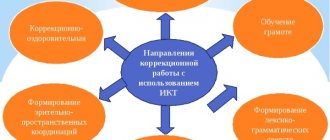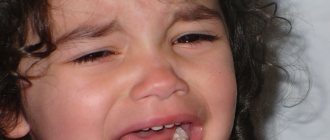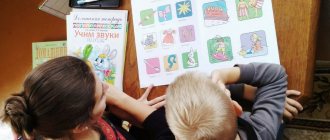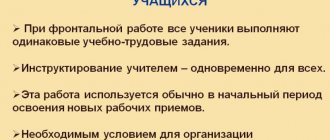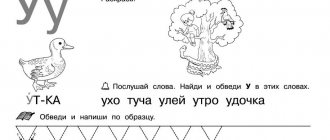Advantages of our kindergarten
Our establishment is rightfully very popular in Moscow, because we offer:
- The most modern and effective methods for correcting speech defects
- General and, if necessary or at the request of parents, individual lessons
- Fun learning process
- High level of knowledge of the preschool program
- Comfortable and spacious premises, equipped according to all modern requirements
- Balanced diet
In addition, our staff consists of exclusively experienced teachers with extensive experience working in children's institutions with a speech therapy focus. Each of them is a true professional in their field, so you can be sure that your child is in good hands.
Despite the fact that our kindergarten is private, the program and teaching methods fully comply with the standards established by the state.
What exactly needs to be done to get into a speech therapy garden?
The staffing of preschool educational institutions today is determined by Order of the Ministry of Education and Science of Russia dated April 8, 2014 No. 293 “On approval of the Procedure for admission to training in educational programs of preschool education.”
So, how to place a child in a speech therapy group in a kindergarten.
Step 1. Get in line for a place in kindergarten - this can be done through the State Services portal (electronic) or on the official website of the mayor of Moscow.
Step 2. Receive a referral from the district clinic to undergo a PMPK (psychological-medical-pedagogical commission). To do this, you will need to visit a pediatrician, neurologist and speech therapist.
Step 3. Collect the necessary documents for the PMPC (check the exact list at the PMPC at your place of residence).
Step 4. Make an appointment at the district PMPC - this can also be done through the State Services portal.
Step 5. On the appointed day, come for the examination with your child.
Classes with a speech therapist
The teaching method used to correct speech defects is called logorhythmics (speech therapy rhythms).
This is the most popular and effective way to correct a child’s speech. It consists of classes with a speech therapist accompanied by music in a playful way, which is very important for the child’s perception and ensuring his complete immersion in the learning process. Thanks to logorhythmics, children master and improve their pronunciation skills, sentence construction, and, in addition, develop their creative potential. During classes, children are offered:
- Breathing exercises;
- Warm up the vocal cords;
- Relaxation exercises;
- Choral and individual singing;
- Mindfulness exercises;
- Exercises that increase the overall tone of the body;
- Oral tasks for the development of creative speech;
In addition to the above, logorhythmics also includes many different techniques for teaching and correcting speech. During such classes in our kindergarten, children behave very actively, which ensures results in the shortest possible time.
Basic teaching techniques
Our teachers use not only well-known, but also unique teaching methods that they themselves have developed.
Correct breathing plays the greatest role in correcting speech functions. To do this, children are offered special offers that will help them take deeper and longer breaths. In exercises aimed at achieving this effect, children are asked to do squats, turns and other elements of regular exercise, but at the same time they must perform speech tasks to pronounce certain words when exhaling. In order to give children proper breathing, the following methods are used:
- A set of vocal and physical exercises;
- Mastering some musical instruments;
- Prolonged stretching of vowels.
The training program is varied and structured in such a way that children do not get tired of the monotony and classes do not turn into a routine. In order to maintain the interest of our students, our teachers constantly change the structure of classes.
The benefits of group classes
Often, many children are afraid or embarrassed to communicate with a speech therapist one-on-one, which negatively affects their perception of the material. When working in a group, this problem does not arise. It is especially important that communication between children and teachers takes place in an informal play environment, so children feel relaxed. In addition, our groups are not as crowded as in most public kindergartens, so the teacher has the opportunity to pay attention to each of the children during the lesson.
Our prices
As for the cost of visiting, we offer the most optimal and affordable prices in Moscow. For the “Development of the XXI Century” network of kindergartens, it is important that our institutions are accessible to everyone. The monthly visit fee is charged at a flat rate, with no surprise increases or additional fees. The only exception is payment for individual lessons - it depends on how many times a month the teacher will work with the child.
| Class | Cost (group) | Cost (individual) | ||||
| Speech therapist | 800 R | 1200 R | ||||
Everything about speech therapy gardens in Moscow - my experience.
I received a huge number of questions about speech therapy gardens after this post. I wrote it a long time ago, but I still receive PM messages on this topic several times a month.
My eldest son Ilya and I have come a very long way to correct, beautiful speech and pronunciation, at the moment the goal is almost achieved. Our son has been to two different kindergartens where these groups exist, and now he is just going to the second kindergarten.
The topic of speech development of children, correction of sound pronunciation, etc. always relevant for parents of preschoolers. I went through this entire difficult procedure of registering a child for speech therapy kindergarten twice, I have real experience and see the results from my son’s stay in the speech therapy kindergarten. I want to share with you our story and my impressions so that you can appreciate all the + and -, firstly, of being and secondly of teaching a child in a logo kindergarten.
There are many different reasons for underdevelopment of speech in children - individual mental and characterological characteristics, pedagogical neglect, genetics also plays a role. In our case, these were external factors, namely stress.
I have always paid special attention to the development of the speech of our eldest son Ilyusha. I was sure that Ilya would start speaking very early, because from birth Ilya was quick in everything. He very quickly went through all the stages on the way to walking upright - he rolled over, crawled, stood up, walked with a support, and at 8.5 months he walked without support, he skipped the “sat down” stage))), he couldn’t sit still, he wanted go anywhere and everywhere at once..
At 3.5 months he uttered his first conscious word - baba. I expected that the first word would be mom))) but my grandmother (my mother) impressed him more at that time))) Ilyusha’s speech did not develop very rapidly (((but within the norm. When Ilyusha was 2 years 6 months (February 2014), I was 11 weeks pregnant and ended up in the hospital with placental abruption. For Ilya, it was a huge stress - we did not look through and did not attach importance to some moments, the child was shocked when he saw my husband taking my bloody things from the hospital and shoes, and then there were two long weeks of mother’s absence. As a result, Ilya’s speech development began to regress (((When Ilya was 3 years and 1 month old, our second son Pashul was born, Ilya considered his brother to be the culprit for his mother’s admission to the hospital, maternity hospital and the source of my pain. His speech turned into the babble of a one-year-old baby with individual words in the form of requests - to drink, eat, shit, etc. I still say “thank you” to those “people” because of whom I then ended up in the hospital and but now I have to sort out all the problems with the speech of my eldest son... For me, this situation with my son has become very traumatic. Many relatives and friends don’t understand that I’m so fussy with my son, but there’s a lot they don’t know and don’t see.
In August 2015, I began to study the issue of Ilya’s psychological state and the optimal solution to the problem of correcting speech development and sound pronunciation.
Since I have a direct connection to psychological science, I know and have worked with excellent specialists, including in the field of neuropsychology.
For almost seven months, a neuropsychologist worked with Ilyusha 1-2 times a week, working through the stress she had suffered and its consequences.
To work on speech correction, I decided to transfer the child to a logo kindergarten. We did not have the means to pay separately for the work of a speech therapist; the services of a neuropsychologist cost us 2,000 rubles. per session and only because this is my good friend and colleague; for other clients the price tag for services is different.
The decision to transfer to a speech therapy kindergarten attracted me because the child is constantly in the kindergarten, a teacher and a speech therapist work with him, and I do not waste my time and money.
To begin with, I went to a regular city clinic and consulted with a speech therapist. The specialist confirmed the correctness of my decision. Having examined Ilyusha, she made a conclusion - general speech underdevelopment (GSD) of the 3rd level - these are the rudiments of correct speech, when a child tries to pronounce many words, distorting them, does not use declensions by gender and cases, and confuses the plural and singular.
In order to provide a place for a child in a speech therapy garden or for a speech therapist to work with a child in a regular kindergarten, you need a conclusion from the Central Psychological, Medical and Pedagogical Commission (CPMPC), but first you need to complete all the documents in your clinic. Certificates from a speech therapist, neurologist, psychiatrist and pediatrician are required, with all certificates you need to go to the head of the pre-school department (pre-school department) in your clinic, from her/him you need a conclusion with which you will go to the commission. To pass the commission, you must also take a reference for the child from the kindergarten he attends.
All information about registration, documents, schedule, etc. on the website of the Moscow Center for Quality Education (if you are from Moscow). I will only say that the queue for the commission is long, you will have to wait a long time, so first sign up for the commission, and then go to the clinic for all the certificates. In 1-2 months you will definitely have time to formalize everything, and then there will be a queue for the Central Medical Processing Center. I waited no more than a week for my son to be registered for kindergarten; my colleague, a neuropsychologist, helped us a lot.
Now I want to reassure all the parents who are scared that the supposedly logo kindergartens have been liquidated and they no longer exist. This is not correct information, in every district of Moscow (I don’t know about Moscow Region) there is a logo garden (this is the best option) or 1-3 regular gardens, but with logo groups (this is the worst case scenario). The only thing that has changed is the number of children in the group, before there were 12-15 children, now there are 20-25. To find out about the presence of such kindergartens or groups in your area, you can call the Moscow Department of Education (more details here) at 8495-530-71-71 and find out how many, what kind and where speech therapy gardens are located in your area.
Now about the gardens or groups themselves. Last school year, my son attended a speech therapy garden; this school year, due to renovations, we moved to another district of Moscow, to live with my parents. I transferred Ilyusha to a regular kindergarten, but to a speech therapy group.
Many people come to me with the question, do I and the child like the kindergarten logo, but here such a question is not entirely correct. If we talk about the level of education and professionalism of speech therapists and teachers, then everything is very good. When people go to work in a logo group, they understand that they must have very good preparation, they must be real professionals in their specialty.
I would draw the attention of parents to the kindergarten staff and to the children in the group. Now here’s a story about logo gardens and logo groups.
In ordinary kindergartens, where there is a group logo, all children who have the conclusion of the CPMPK commission are accepted. This is the main problem - children with speech defects are all very different, very special, with a large number of “interesting diagnoses”. A child’s speech suffers for various reasons - in our case it is stress, i.e. The external impact on the child’s psyche did not affect the son’s behavior in any way; on the contrary, he became more affectionate, touching and caring. But in logo groups there are very “severe” children, I will not describe diagnoses, etc. now. Everyone has seen such children, every ordinary group of d/s has its own brawlers, biters, hooligans, or all together - children “not themselves” or, as I call them, “lukewarm”. Now imagine what’s yours!!! normal
!!! a child who pronounces some sounds poorly and says “red apple” is placed in a group where there are 15 out of 23 “lukewarm” children. The kindergarten staff will work their asses off so that your child develops in terms of speech, but very bad things will happen to his behavior strong changes are not for the better ((( Therefore, you need to look for a speech therapy garden, there are 2 groups for each age, one group for “warm” children, the other for normal children.
My son was in speech therapy kindergarten last year, I still remember the speech therapist and our teacher with warmth, we congratulate her on the holidays and give her tickets to the Kremlin for ballets. We are very grateful to her for everything, she and the speech therapist made every effort to make Ilyushin’s speech and sound pronunciation better. Of the sounds, only “R” could not be “placed” within a year, but this sound usually appears in such children only by the age of 6.
This school year, Ilyusha is attending a speech therapy group in a regular kindergarten. I’m ready to erect a monument to the teachers, they are wonderful, I can’t find words to describe my gratitude to them and the speech therapist. Through my efforts and theirs, in addition to the word-formation aspect of speech, we managed to “start the engine”, I heard “R”, now we are on the way to automating this sound, and the teachers and I also taught Ilyusha to read. At the age of 5 years 5 months, my son began to read syllables))) of course, everything happens very slowly, while these are short words like FOREHEAD, MOSS, SOUP, etc., but I’m happy. There is also progress with mathematics - subtraction and addition within 10. He tries to do everything “in his head”, but the counting sticks are always at the ready.
The children in this group are very complex, I don’t want to describe what’s what, I think that you can imagine it this way... Next school year I will transfer Ilyusha to a regular kindergarten - our favorite 2010 “Harmony”, to the kindest Zula Anatolyevna (if you’re reading, then ) for rehabilitation after the “lukewarm” ones, which have a bad influence on Ilya.
You should also pay attention to the program used in the logo group, there are only three of them. Last year, I didn’t pay attention to what program Ilya was studying in, but this year, when I signed the contract, I read in it that Nishcheeva’s program was used. I really like that the children have a whole week to master a topic, for example, “Birds of Migratory”, “Furniture”, “Winter”. At the end of the week, the parents and the child make a project and the child defends it in a group in front of the children and the teacher.
As far as I understand, but I may be a little wrong in the order of actions, a day in the garden looks like this - from 8.00 the children come, do a logical dictation in notebooks with large squares, and have breakfast. At 9.00-9.30 the teacher begins to study the topic of the week; during these classes a lot of material is given in different forms. Then the speech therapist begins to invite children to classes. Then the children are given fruit to snack on and math classes or letters are studied. At 11.30 they go for a walk, I don’t remember exactly by the hour, but after the walk there is lunch and a nap, after sleep there is an afternoon snack and some time for games. At 16.00 classes again, and then a walk and dinner.
Children have practically no time to breathe out))) but such an intense pace of classes brings very good results.
If it weren’t for the number of “warm” children, I would be 100% satisfied with the logo garden. In any case, even this option is better than a child being in a regular kindergarten group, with significant defects in sound pronunciation and delayed speech development, and then at school having problems in Russian language lessons, because how he speaks/hears is how he writes will be(((And of course, no parent wants his child to grow up with a burr or a lisp.
I hope that in this post I was able to answer all the questions about speech therapy kindergartens at once.
Later I’ll write about what benefits my son and I are currently studying in the kindergarten and how we are doing it at home.
Good luck to everyone in their studies to achieve correct and beautiful speech.
